Starting a Plant Based Diet Uk
If you're thinking of adopting a vegetarian lifestyle or are maybe just curious about vegan cooking, choosing to incorporate more plant-based meals into your diet has a slew of benefits for you and the planet. Making the shift towards plant-based eating is easier today now more than ever, namely because over 16 million Americans consider themselves vegetarian.
Not only is the plant-based community vast, but food establishments and restaurants are even starting to take notice and step up with tasty vegan alternatives to classic meat and dairy items. Here is everything you need to know about starting a vegetarian diet, including recipe inspiration and a complete shopping list.
Want to kick-start your meatless journey? Try our member-exclusive 7-Day Meatless Meals Challenge ( sign up for GH+ to get full access!). Our step-by-step guide will teach you how to wean yourself off meat while enjoying delicious vegan and vegetarian recipes.
Choosing your vegetarian diet:
There are a few different types of vegetarian diets to consider when determining which is right for you. Some versions of a vegetarian diet allow fish and dairy, while others are stricter. Here are the various types of plant-based diets to choose from:
- Vegan: This approach is the strictest of the bunch and involves a completely plant-based diet that excludes meat, poultry, fish, dairy, eggs and other animal-based products like honey and gelatin.
- Vegetarian: Based on the principles of a vegan diet, this option eliminates meat, poultry and most animal-based products. This category can also be further divided into:
- L acto-ovo vegetarian which allows both eggs and dairy.
- L acto vegetarian which includes dairy products but not eggs.
- Ovo vegetarian which incorporates eggs but not dairy products.
- Pescatarian: This approach stems from following a vegetarian diet but incorporates fish and seafood. Pescatarians avoid all other meats, though some choose to eat dairy products and eggs.
- Flexitarian or Semi-Vegetarian: A more flexible option, this diet encourages mostly plant-based foods but allows for meat and other animal-based products in moderation.
- Plant-Forward: This style of cooking and eating places an emphasis on plant-based foods. Meat can be included in this diet, though it is not usually the main feature of the meal.
The benefits to going vegetarian:
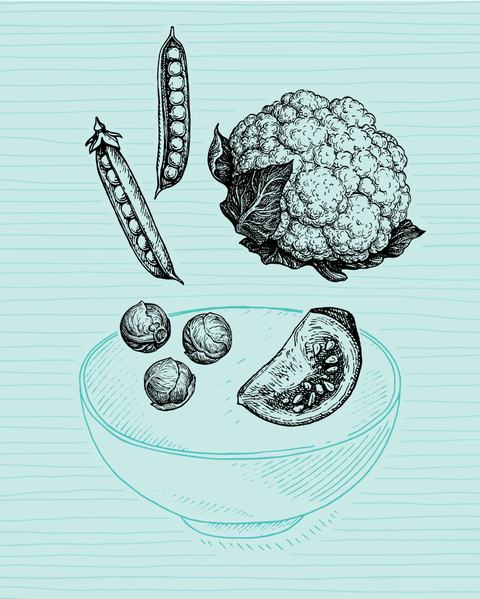
Getty Images
From cutting down your grocery bill to serving up some serious health benefits, the pros of a vegetarian lifestyle are vast. Here are just a few reasons to motivate you on your journey:
Health Benefits
- Heart healthy: Your ticker is responsible for pushing millions of gallons of blood to every part of your body, and over the course of an average lifetime beats 2.5 billion times. Plant-based diets that are higher in plant foods and lower in animal foods can help keep it strong, as they've been associated with reduced risk of heart disease and lowering cholesterol (especially the bad "LDL" kind).
- Reduce risk of certain cancers: Eating too much red meat and processed meat (think things like bacon and sausage) has been associated with increased risk of certain types of cancers. But by eliminating those foods and following a vegan or vegetarian diet, you can substantially lower your risk. That's why the American Institute for Cancer Research recommends eating a diet rich in whole grains, veggies, fruits and pulses year after year.
- Support immunity: Produce is abundant in antioxidants and other essential nutrients that we can't get from other foods. These vitamins, minerals, phytochemicals, and antioxidants all work to keep your cells healthy and your immune system in tip top shape. Certain varieties abundant in vitamin C like strawberries, red bell peppers and oranges are especially helpful for immune support.
- Improve your skin: The antioxidant abundance of plants can help fight free radicals and reduce inflammation, which may promote better complexion and reduce fine lines and wrinkles over time.
- May promote weight loss: Fiber-rich foods tend to be nutrient-dense, keeping you full for longer and oftentimes on less calories than their low-fiber counterparts. By cutting out high-calorie animal-based foods like fatty meats and cheese and replacing them with more filling plant-based options, you may create a caloric deficit to promote healthy weight loss.
Environmental Impact
Not only are plants great for your health, but they do wonders for the earth too. Following a vegan diet may be the single best way for us to create a greener and more sustainable earth. Probably the most compelling stats out there to support the shift towards plant-based come with reducing your water footprint.
Meat has a significantly higher water footprint than grains, vegetables or beans. Research shows that a pound of beef alone can take anywhere from 2,000-8,000 gallons of water to produce, but the same amount of tofu only requires 302 gallons of water and a pound of unprocessed oats needs 290 gallons of water. By adopting a meat-free diet, research suggests that you can reduce your water footprint by up to 55%. But even just a small reduction in your meat consumption can make a significant difference over time on this planet and can provide you with consistency and peace of mind.
Economical
Take a look at your grocery bills and you'll notice that meat and animal-based products tend to be the most expensive items on the list. Opting for whole plant foods like veggies, fruits, whole grains, legumes and more, especially when purchased in bulk, can help you stay on budget. Frozen produce is also a great option that will last longer and is equally (if not more) nutritious than fresh at a typically lower price point. Just make sure that you check ingredients on frozen vegetables; look out for fillers, extra sugar and salt.
Tips for starting a vegetarian diet:
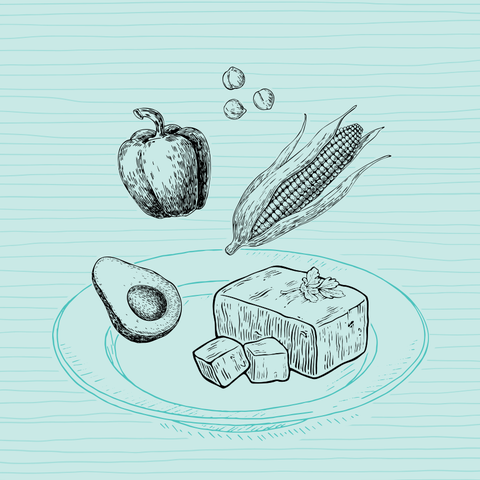
Getty Images
You may feel tempted to jump right in to a vegan diet, but completely eliminating meat and animal-products can be quite tough, especially if they already make up the majority of the foods you eat. Your diet can be sustainable for the planet, but it also has to be sustainable for you. Plus, eating more produce means you'll be upping the fiber in your diet which can mean a little more bathroom visits. But not to fret; this is a normal part of transitioning to a high fiber diet and shouldn't last too long, just make sure to stay hydrated to help fiber digest properly in your body. Some other important tips to try include:
- Go vegetarian in phases: A sudden shift towards vegetarian eating can be difficult, so instead try cutting one thing at a time, like eliminating red meat at first. Then, two weeks later, nix poultry and fish. As you eliminate foods, make sure you are adding in nutritious choices to counterbalance and have something to look forward to eating.
- Try it part-time: Many individuals chose to ditch animal products a few days a week, which may be ideal for you. You can also opt to make at least one meal a day completely plant-based by picking whichever meal is easiest to make the change for your lifestyle. Remember that nobody is perfect, so give yourself permission to slip up! Just do the best you can as you acclimate to the diet.
- Be adventurous: You don't need to stick to force-feeding yourself tofu and broccoli, especially if you hate it. There is a world of naturally plant-based foods that await you, so don't be afraid to be adventurous and try a new vegetarian food each week. Some great choices include nutritional yeast, cashew butter, edamame, jackfruit and banana blossom.
- Incorporate plant-based substitutes: In order for a vegetarian diet to work, you should try to build in choices that don't make you feel deprived. If you used to love yogurt for breakfast, try coconut-milk yogurt as a non-dairy option. If letting go of red meat is challenging, meat alternatives may be perfect for you. Try your best to choose options with the fewest processed ingredients, and take note of sodium and added sugar counts too.
- Ask for help: Vegetarian doesn't always translate to healthy; in fact, foods like potato chips, Skittles and even Oreos are all totally vegan but won't promote good health if you're eating them regularly. And the diet in general may feel overwhelming and you may be nervous that you're not getting adequate nutrition. Consider reaching out to a plant-based Registered Dietitian for assistance who can help troubleshoot any specific issue you're having, from navigating take-out menus to helping you figure out how to create a balanced vegetarian plate.
Nutrients to pay attention to on a vegetarian diet:
Eliminating animal products from your diet warrants special attention to a few key nutrients that you should be getting enough of on a daily basis. A few important nutrients to pay attention to while transitioning to and following a vegetarian diet include:
- Protein: Since you are cutting out animal sources from your diet, you may be concerned about meeting your protein needs. After all, protein is an important macronutrient that is needed for multiple functions in the body like building and repairing muscles. But there are plenty of plant-based protein sources to take advantage of including beans, lentils, peas, nuts and nut butters, edamame, tofu, tempeh, quinoa, soy milk and more. If you're still concerned that you aren't meeting your nutritional needs, vegan protein powders may come in handy.
- Iron: Iron enables red blood cells to carry oxygen throughout the body. But plant-based sources of iron aren't as readily absorbed in the body as animal-based foods. A solution is for vegetarians to pair plant-based iron foods with vitamin C rich foods which significantly improves iron absorption. Squeeze some lemon juice in your bean salad vinaigrette or over sautéed spinach. Other vitamin C rich foods can be paired well too.
- Vitamin B12: This important vitamin is crucial for red blood cell production and nerve development, but is often found in animal foods like red meat. In a vegetarian diet, foods like nutritional yeast and B12-fortified foods like cereals and non-dairy milks can help you meet your needs.
- Vitamin D: Important for helping maintain strong bones and supporting a healthy immune system, vitamin D is actually a hormone in the body. It can be synthesized by the sun, but if you have limited sunlight exposure, you'll have to get enough vitamin D through your diet or supplementation. Pescetarians can incorporate rainbow trout and salmon into their routine for healthy fats and vitamin D, but those avoiding fish can try sliced white mushrooms that have been exposed to UV light which is the only vegetable source of vitamin D.
- Calcium: Cutting out dairy products may make you nervous about meeting your calcium needs, an important nutrient for building bones and bone strength. But foods like soybeans and calcium-fortified plant-based milks are great options. Dark leafy greens like bok choy and collard greens also contain calcium but shouldn't be relied on as a primary source.
Your full vegetarian shopping list:
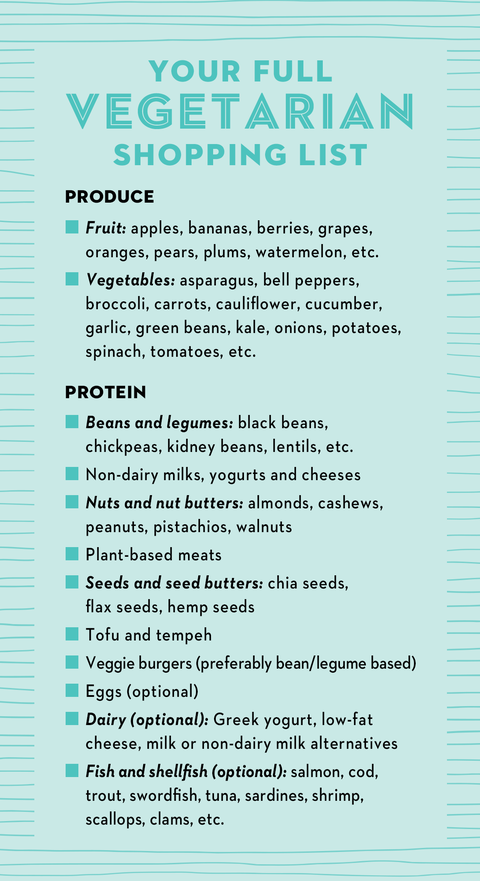
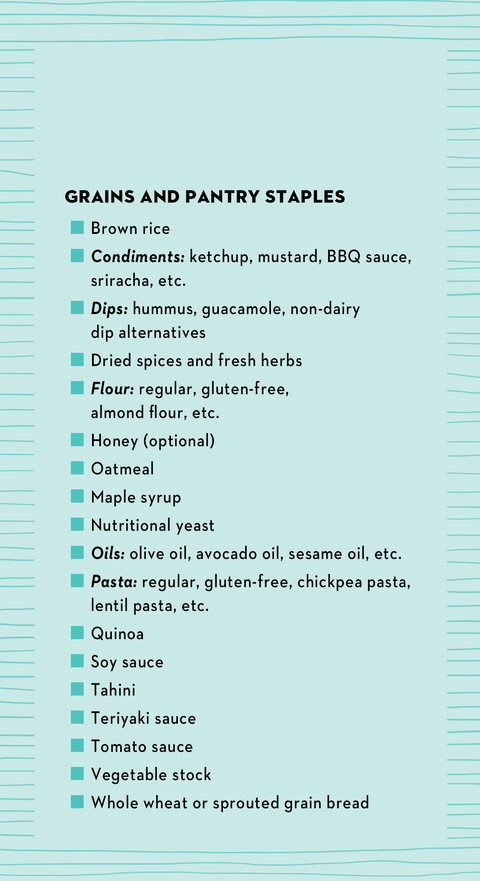
Produce
- Fruit: apples, bananas, berries, grapes, oranges, pears, plums, watermelon, etc.
- Vegetables: asparagus, bell peppers, broccoli, carrots, cauliflower, cucumber, garlic, green beans, kale, onions, potatoes, spinach, tomatoes, etc.
Protein
- Beans and legumes: black beans, chickpeas, kidney beans, lentils, etc.
- Non-dairy milks, yogurts and cheeses
- Nuts and nut butters: almonds, cashews, peanuts, pistachios, walnuts
- Plant-based meats
- Seeds and seed butters: chia seeds, flax seeds, hemp seeds
- Tofu and tempeh
- Veggie burgers (preferably bean/legume based)
- Eggs (optional)
- Dairy (optional): Greek yogurt, low-fat cheese, milk or non-dairy milk alternatives (i.e. almond milk, oat milk, etc.)
- Fish and shellfish (optional): salmon, cod, trout, swordfish, tuna, sardines, shrimp, scallops, clams, etc.
Grains and pantry staples
- Brown rice
- Condiments: ketchup, mustard, BBQ sauce, sriracha, etc.
- Dips: hummus, guacamole, non-dairy dip alternatives
- Dried spices and fresh herbs
- Flour: regular, gluten-free, almond flour, etc.
- Honey (optional)
- Oatmeal
- Maple syrup
- Nutritional yeast
- Oils: olive oil, avocado oil, sesame oil, etc.
- Pasta: regular, gluten-free, chickpea pasta, lentil pasta, etc.
- Quinoa
- Soy sauce
- Tahini
- Teriyaki sauce
- Tomato sauce
- Vegetable stock
- Whole wheat or sprouted grain bread
Best vegetarian recipe ideas:
For more, check out our favorite easy vegetarian recipes for the whole family.
Best vegetarian cookbooks:
Looking for more information on cooking while vegetarian? There are a ton of great cookbooks to add to your collection:

Good Housekeeping Everyday Vegan
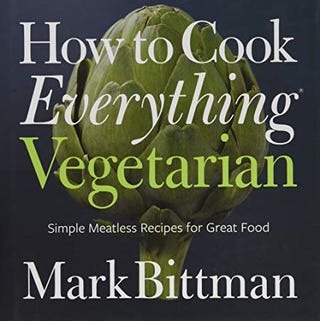
How to Cook Everything Vegetarian
Houghton Mifflin Harcourt amazon.com

The Complete Vegetarian Cookbook
America's Test Kitchen amazon.com

Forks Over Knives ―The Cookbook
The Experiment amazon.com
$11.26

The Oh She Glows Cookbook
Angela Liddon Thomas E Griess amazon.com

This content is created and maintained by a third party, and imported onto this page to help users provide their email addresses. You may be able to find more information about this and similar content at piano.io
Starting a Plant Based Diet Uk
Source: https://www.goodhousekeeping.com/health/diet-nutrition/a36120401/how-to-be-a-vegetarian/